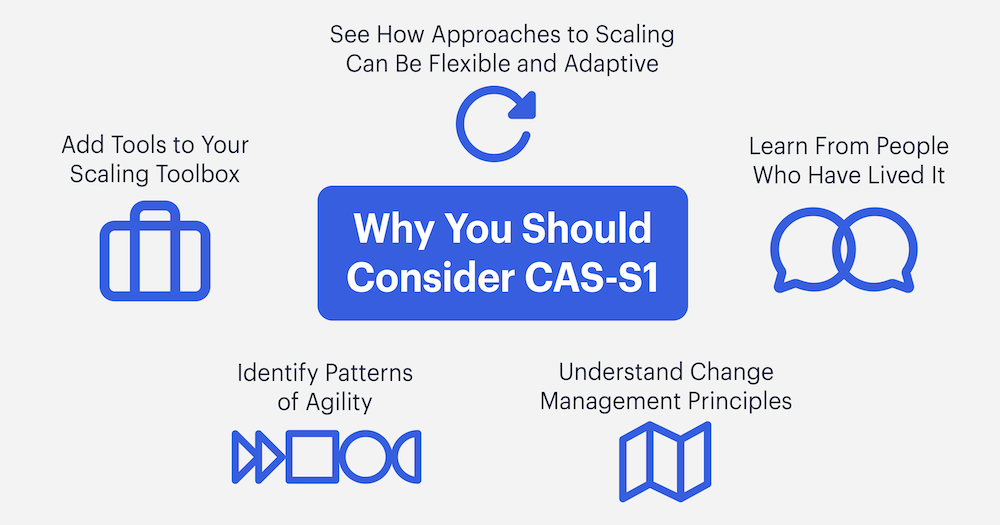Learn about purchasing for teams
Why You Should Consider CAS-S1 from Scrum Alliance

Scaling agile in an organization has remained a mystifying, perplexing, and baffling idea for many. For example, a chosen scaling framework may prove unsuccessful, or you may find your own attempt at adopting agile across multiple teams is proving unproductive.
Certified Agile Skills Scaling 1 (CAS-S1) guides you through the principles and patterns of agility that will allow you to pursue a tailored approach to scaling in your organization. This skill-based course unravels what may seem like the mystery of scaling and enlightens learners on these questions:
- What is scaling?
- Why scale or why not?
- How do I approach scaling?
- And how do I make an agile scaling endeavor successful?
What is Certified Agile Skills - Scaling 1?
Certified Agile Skills - Scaling 1 is a certification course that approaches scaling as a means to an end, not an end itself. It is focused on the ideal for scaling—increasing organizational capacity in an autonomous and collaborative way while maintaining team flexibility.
Reasons to choose the CAS-Scaling 1 course
Add tools to your scaling toolbox
 To effectively implement agile scaling, it is essential to have a deep understanding of the organization, its domain, and its culture. It's also helpful to have the skills to recognize, implement, and customize scaling patterns and change patterns to fit the unique requirements of your organization.
To effectively implement agile scaling, it is essential to have a deep understanding of the organization, its domain, and its culture. It's also helpful to have the skills to recognize, implement, and customize scaling patterns and change patterns to fit the unique requirements of your organization.
It includes managing the complexity and chaos involved in scaling large agile projects or products and finding simple and clear solutions to deal with it.
See how approaches to scaling can be flexible and adaptive
Agile scaling must be adaptive in its agile practices to suit an organization's unique context. It should be open to experimentation and continuous improvement.
Understand change management principles
Agile scaling often requires a significant shift in an organization's culture and processes. Agile coaches and other change agents should be well-versed in organizational change management principles and practices to facilitate this transition smoothly. This also includes building effective leadership at all levels of the organization and creating an environment where agile can thrive.
Identify patterns of agility
Understanding how to identify and mitigate risks, impediments, and challenges that can arise during the agile scaling process is vital. This includes addressing issues related to dependencies, resource allocation, team formation, and changes in the organization.
Effective collaboration among multiple teams is essential for scaling agile. Agile coaches, leaders, and change agents should understand the dynamics of cross-functional and cross-team collaboration and how to foster it.
Learn from people who have lived it
Real-world experiences from industry experts about organizations that have successfully scaled agile can provide valuable insights. Learning from those who have gone through the process is highly beneficial.
Why we developed a scaling course
Organizations struggle over and over again when it comes to scaling their agile adoption. This struggle has been experienced by leaders, coaches, scrum masters, change agents, and employees across these organizations.
Some of those challenges include:
- A “one-size-fits-all” approach to scaling does not work for a given context and a unique organization
- Pre-defined frameworks or methodologies often provide guidance on scaling, but they do not teach the ability and expertise needed to scale
- The scaling approach is not industry agnostic and turns out to be unsuccessful for your context
- The organizational culture lacks the traits needed for scaling to succeed (for example: a lack of trust, an "us vs. them" mentality among management and everyone else, and a single decision-maker at the top)
- The organizational approach is that scaling is just another process to be followed instead of seeing scaling as a mindset shift that supports the reduction of waste and seamless, fast-paced collaboration
- When looking for processes, tools, tips, and techniques for planning and executing agile adoptions, there is no dependable source of information or guidance that is available
- Agile scaling challenges are not specific to the type of framework or methodology used
- We have been focused on implementing methodologies and frameworks exactly as they are defined and fail to see the patterns in organization, in teams and individuals, and in challenges and solutions
Teams across industries want flexible tools and practices they can utilize in their unique environments. CAS-S1 provides the skills, knowledge, and mindset to take an adaptive approach to growing and achieving right-sized agility for your business.
The next step
Ready to achieve lasting transformation with an adaptable approach to agile scaling? Search course listings and register for Certified Agile Skills - Scaling 1. Receive a CAS-S1 certification after you successfully complete the course and a two-year membership with Scrum Alliance.










